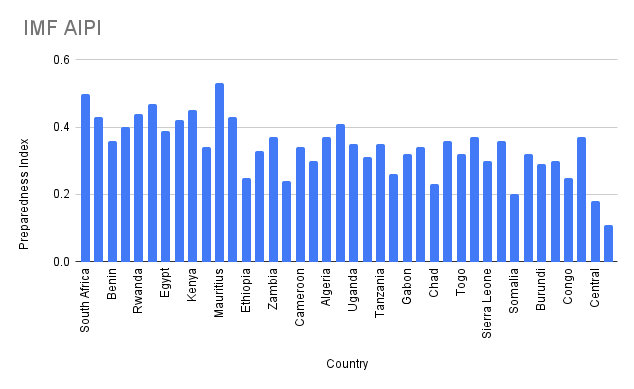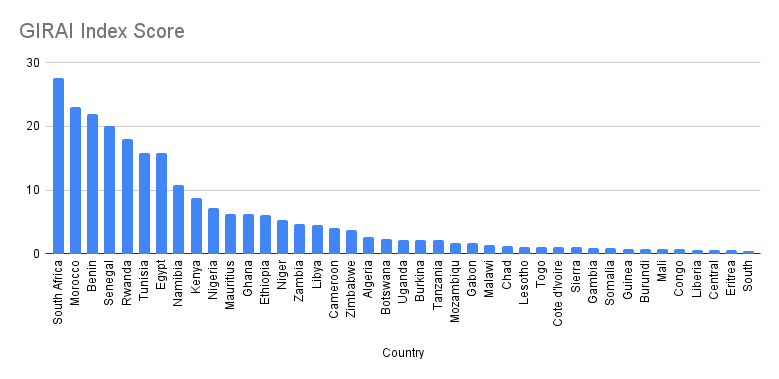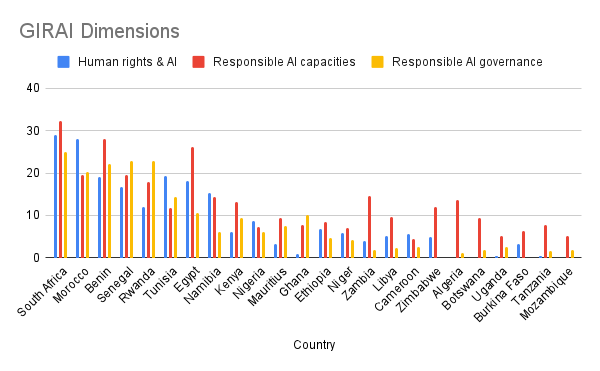
Africa’s potential to harness AI for economic growth and social development is immense, yet it faces unique challenges in implementation and governance. To comprehensively understand Africa’s position in this rapidly evolving field, we focus on two significant global indexes: the IMF AI Preparedness Index (AIPI) and the Global Index on Responsible AI (GIRAI). These indexes are valuable tools for assessing Africa’s readiness for AI adoption and its commitment to ethical AI practices. Examining these metrics in tandem, we aim to paint a nuanced picture of Africa’s AI ecosystem, bridging the gap between economic preparedness and ethical responsibility.
The data for this analysis were obtained from the IMF’s DataMapper tool for the AIPI and the Global Index on Responsible AI (GIRAI) website. The study included all African countries listed in both datasets.
AIPI and GIRAI
The AIPI score for each country reflects its overall preparedness for AI, considering factors like digital infrastructure, human capital, and legal frameworks. This index provides insights into African nations’ technological and institutional readiness to integrate AI into their economies and societies.

The GIRAI score, on the other hand, focuses on a country’s responsible AI implementation, measured through nineteen thematic areas. Each thematic area assesses the performance of three pillars of the responsible AI ecosystem: Government frameworks, government actions, and non-state actors’ initiatives. This multifaceted approach offers a comprehensive view of how African countries address AI adoption’s ethical and societal implications.
Preliminary findings reveal intriguing patterns. According to GIRAI scores, only four African countries – South Africa, Morocco, Benin, and Senegal – secured an index above 20%. Interestingly, the IMF data suggests that some of these same top countries from the GIRAI have also demonstrated better preparedness indices. Their success has been attributed to several pillars used by GIRAI, with non-state actors taking the lead in three of the four countries.
GIRAI Pillars (Top ten)
Analyzing government frameworks, actions, and non-state actors across the top 10 African countries regarding AI readiness reveals diverse approaches and strengths. South Africa leads with a robust ecosystem driven predominantly by non-state actors (68.53), while its government frameworks (3.26) lag significantly behind its government actions (31.5). This pattern of non-state actor involvement is mirrored in Morocco and Tunisia, suggesting a pivotal role for the private sector, academia, and civil society in advancing AI initiatives. Conversely, countries like Rwanda and Egypt showcase robust government frameworks (29.74 and 24.62, respectively) but minimal non-state actor involvement, indicating a more government-led approach to AI development and governance.
Interestingly, there’s often a disconnect between government frameworks’ strength and government actions’ implementation. Senegal, for instance, boasts a robust government framework (26.76) among the top countries but shows comparatively weaker government actions (13.34). Namibia presents a unique case with no formal government frameworks (0) yet moderate government actions (19.83), highlighting that practical implementation can sometimes precede formal policy structures. Kenya and Nigeria must demonstrate substantial government involvement across frameworks and actions, relying more heavily on non-state actors to drive their AI agendas. This varied landscape underscores the importance of tailored strategies for AI development that leverage each country’s unique strengths, whether in government initiative, private sector innovation, or a balanced approach between the two.
GIRAI Dimensions
The GIRAI dimensions reveal a complex and uneven landscape of AI development across Africa. South Africa emerges as a clear leader, scoring highest in Human rights & AI (28.93) and Responsible AI capacities (32.4) while still performing strongly in governance (24.99). This suggests a holistic approach to AI development that balances ethical considerations with technical capabilities. However, the stark contrast between South Africa and countries scoring zero in some dimensions, such as Algeria and Botswana in Human rights & AI, highlights a significant gap in addressing crucial ethical aspects of AI across the continent. Interestingly, some countries show unexpected strengths in specific dimensions – for instance, Senegal leads in Responsible AI governance (22.89) despite lower scores in other areas, indicating focused efforts on regulatory frameworks.
The data also reveals a trend where countries perform better in Responsible AI capacities compared to the other two dimensions. This suggests prioritizing technical and institutional capacity building over ethical and governance considerations in many African nations. For example, Zambia scores 14.52 in AI capacities but only 4.07 in Human rights & AI. This imbalance could lead to rapid AI adoption without adequate safeguards for human rights or proper governance structures. Moreover, the generally low scores across all dimensions for many countries indicate that responsible AI practices are still in the nascent stages across much of Africa. The variability in scores between dimensions within countries (e.g., Egypt scoring 26.07 in AI capacities but only 10.55 in governance) highlights the need for more balanced and comprehensive approaches to AI development that equally address ethical, technical, and regulatory aspects.
South Africa topping both Indexes
South Africa is a leader in Africa’s AI landscape, boasting top scores in the IMF AI Preparedness Index (0.5) and the Global Index on Responsible AI (27.62). This dual excellence underscores South Africa’s balanced approach to AI development, emphasizing economic readiness and ethical responsibility. The GIRAI breakdown reveals a striking feature of South Africa’s AI ecosystem: the dominant role of non-state actors, scoring an impressive 68.53 compared to government frameworks (3.26) and actions (31.6). This suggests that private sector initiatives, academic institutions, and civil society organizations are driving progress in responsible AI practices, potentially compensating for less developed governmental structures.
Diving deeper into the GIRAI dimensions, South Africa shows particular strength in Responsible AI capacities (32.4), focusing on building the skills, infrastructure, and knowledge necessary for ethical AI development. The country also performs reasonably well in addressing Human rights & AI concerns (28.93) and implementing Responsible AI governance (24.99). However, the significant gap between non-state actors’ performance and government frameworks indicates an opportunity for policy development to catch up with on-the-ground initiatives. South Africa’s case demonstrates that while formal governmental structures may lag, a vibrant ecosystem of non-governmental stakeholders can significantly advance responsible AI practices. Moving forward, South Africa’s challenge will be to leverage this non-state actor momentum while strengthening government frameworks to create a more cohesive and comprehensive approach to AI development and governance.
Understanding Disparities
The significant disparities observed between countries and dimensions can be attributed to several factors. Firstly, varying levels of economic development and digital infrastructure across African nations directly impact their capacity to invest in AI technologies and skills. Countries with more advanced economies, like South Africa and Morocco, are better positioned to allocate resources to AI development across all dimensions. Secondly, political priorities and governance structures play a crucial role. Some countries may prioritize economic growth through AI adoption (reflected in higher scores for AI capacities) without equally emphasizing ethical considerations or governance frameworks. This could explain why countries like Zambia score higher in AI capacities but lower in human rights and AI.
Additionally, the influence of international partnerships and foreign investments in AI can create disparities, with some countries benefiting from knowledge transfer and resources that boost specific dimensions. The role of non-state actors also varies significantly; in countries where the private sector or civil society is more active in AI development, we see higher scores in related dimensions, as exemplified by South Africa. Lastly, the newness of AI as a policy area means that many countries are still in the early stages of developing comprehensive approaches. This leads to uneven progress across different aspects of responsible AI implementation.
Recommendations and Future Outlook
Our findings suggest several vital recommendations for advancing responsible AI development across Africa. First, countries should strive for a balanced approach that addresses all three GIRAI dimensions equally. This means building technical capacities and strengthening human rights considerations and governance frameworks. Governments should work on developing comprehensive AI strategies that include clear ethical guidelines and regulatory frameworks. Also, fostering partnerships between government, academia, and the private sector could help countries like Rwanda and Egypt, which show robust government frameworks but limited non-state actor involvement, create more robust and innovative AI ecosystems. For countries lagging in formal frameworks, like Namibia, prioritizing the development of AI policies while maintaining practical implementation efforts is crucial. Regional cooperation and knowledge sharing among African countries could accelerate progress, allowing nations to learn from success stories like South Africa and adapt strategies to their local contexts.
Conclusion
In conclusion, the analysis presented underscores the critical importance of a multi-stakeholder approach to achieving AI readiness in Africa. While a strong foundation in digital infrastructure, human capital, and legal frameworks (as measured by the AIPI) is essential, proper preparedness touches on responsible AI implementation (as measured by the GIRAI). This requires government leadership in establishing policies and regulations and active participation from non-state actors, such as civil society organizations and the private sector. By fostering a more inclusive environment for responsible AI development, African countries can harness the transformative potential of AI while mitigating its risks and securing a place at the forefront of the global AI landscape.




